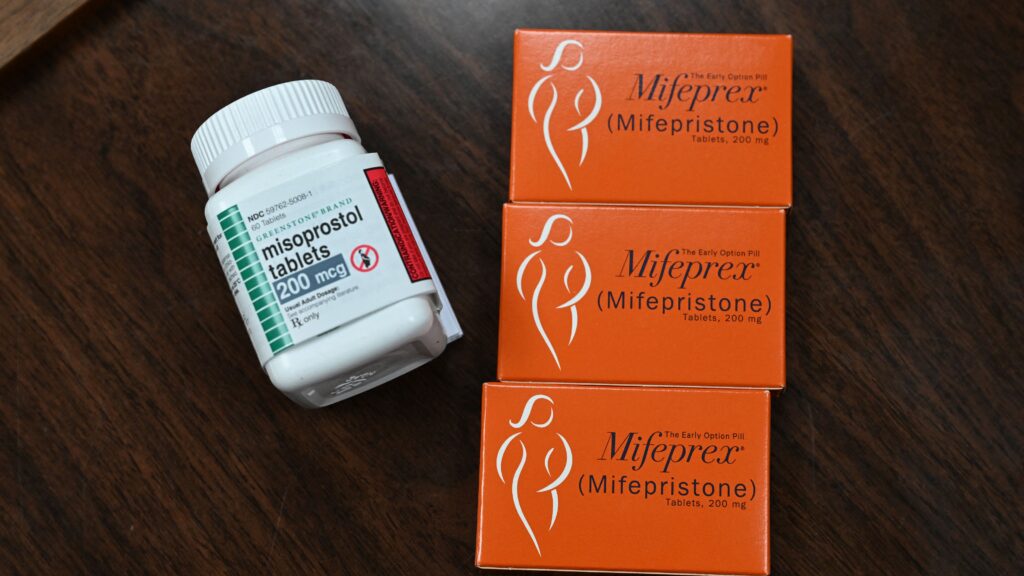A federal appeals court heard arguments Wednesday in a case that could determine the future of a commonly used abortion pill, opening a line of questioning centered around the drug’s safety and what at least one judge suggested is the fallibility of national drug regulators.
The three-judge panel at the Ninth Circuit Court of Appeals is tasked with reviewing the legal challenge to the Food and Drug Administration’s 2000 approval of mifepristone. Last month, the U.S. Supreme Court upheld a stay that kept the drug on the market and punted the decision about its future back to the appeals court. While the judges — a George W. Bush appointee and two Trump appointees — questioned the drug’s safety, they also interrogated plaintiffs’ claim that doctors who object to abortion were being forced to provide care under current mifepristone regulations.
However, two judges repeatedly came back to the FDA’s decision-making and seemed to reject the government’s argument that a Texas federal judge ordering mifepristone off the market represented “an unprecedented and unjustified attack on FDA scientific expertise,” as U.S. Deputy Assistant Attorney General Sarah Harrington said.
“I don’t understand this theme [that] ‘the FDA can do no wrong.’ That is basically the narrative you’re putting forth — nobody should ever question the FDA,” Judge James Ho said after hearing from both Harrington and Jessica Ellsworth, a lawyer for Danco Laboratories, which makes the pill.
Judge Jennifer Walker Elrod — who has previously ruled against other abortion procedures — criticized Danco for similar language calling the Texas decision “an unprecedented judicial assault on a careful regulatory process,” in its brief.
“Do you think it is appropriate to attack the district court personally in the case, in that way?” she asked Ellsworth.
The FDA approved mifepristone more than 20 years ago for abortion and miscarriages up to seven weeks of pregnancy, and in 2016 extended approval up to 10 weeks of pregnancy, covering the period when the vast majority of abortions occur, and later loosened in-person prescribing requirements. Over two decades, fewer than 1% of mifepristone users have reported serious side effects.
Harrington argued that makes mifepristone far safer than other commonly used drugs. However judges questioned whether telehealth prescribing — which was permanently authorized by the FDA in December 2021 — could pose more risks.
Harrington argued that emergency complications from mifepristone use are exceedingly rare, and noted doctors with conscientious objections are not required to treat patients having an abortion. That argument is critical to the government’s case, because the plaintiffs, the anti-abortion Alliance for Defending Freedom, have argued providing after-abortion care has caused opposing doctors irreparable harm.
Erin Hawley, a lawyer for plaintiffs Alliance for Defending Freedom, argued there is a “disconnect” in what government lawyers consider irreparable harm to doctors who consciously object to abortion.
“Their conscience harm is much broader,” said Hawley, who is married to Sen. Josh Hawley (R-Mo.). “They allege that they feel complicit in elective abortion by being forced to complete that procedure [when there are complications from mifepristone use].”
It was not clear whether judges, which also included Judge Cory Wilson, a Trump appointee, were convinced by that argument. Lawyers for Danco and the FDA had also previously argued that emergency follow-up is extremely rarely needed.
Wilson asked whether questioning FDA’s mifepristone changes means taking the same approach any time the FDA relaxes prescribing limits or requirements.
“How do you draw that line?” he said. Ho also asked Harrington whether the FDA would follow court orders, alluding to the possibility — raised by legal experts and referenced by Supreme Court Justice Samuel Alito in his dissenting opinion — that the agency would not enforce limits like mail-order delivery restrictions. Harrington said the agency “absolutely” would follow orders. Commissioner Robert Califf also told Congress recently that the agency “will comply with any court orders.”
There is no deadline for a ruling in the case, which means the court’s decision — which would likely be appealed — could come at any point.


